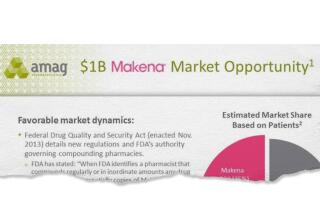Drug Firm Faces Action on Marketing : Medicine: FDA and Justice Department take a new tack in enforcement. Company is accused of misleading promotion of its colitis medication.
- Share via
WASHINGTON — Pursuing a new avenue of drug industry enforcement, the Food and Drug Administration and the Justice Department announced Monday that they have taken legal action against a pharmaceutical company for promoting a drug for unapproved uses solely to increase its sales.
Kabi Pharmacia Inc., of Piscataway, N.J., will be required under a consent decree signed with the FDA to undertake an extensive campaign to correct misleading promotion and advertising for its ulcerative colitis drug Dipentum, the FDA said.
The agency said that the company promoted Dipentum--which had been approved for one very narrow usage--as a better drug than the accepted first-line therapy and told doctors that it could safely be used on children, which is not true.
Although the action involves only one firm, FDA Commissioner David A. Kessler called it “the first significant case ever” against a practice known as “detailing,” in which a company’s sales force promotes its products through such activities as personal visits to physicians.
Doctors are subjected to numerous pressures from drug manufacturers to select one drug over another, particularly when more than one therapy exists for a condition. Promotion by drug companies, including advertising, is estimated to run into the billions of dollars annually.
Kessler said that this case should serve as a strong warning that the agency will not tolerate companies that promote drugs “to increase market share at the expense of patients.”
He said drug promotion “that is not aimed at the proper treatment of patients is one of the factors contributing to the rising costs of health care in this country, and we all need to address that issue head-on.”
“This is not about one New Jersey company,” he added. “This is about what’s going on in detailing. This case sends a message that we take these violations seriously. This will not be the last such case of its kind.”
The company said that the consent decree does not question the safety or efficacy of Dipentum when used as directed on the approved labeling.
“We signed this consent decree, in which there are no admissions of wrongdoing, because we felt that it was in the best interests of patients, physicians and our employees to put this incident behind us and to move forward on a positive note,” Anders Wiklund, Kabi’s president, said in a statement.
Although physicians upon occasion recommend that drugs be used for unapproved purposes, the FDA does not have the authority to regulate doctors’ practices.
But the agency does have the authority to take action against a firm that is promoting a drug for unsanctioned uses, particularly if there is reason to believe that such uses could prove harmful, as the FDA said was the case with Kabi.
Dipentum was approved by the FDA on July 31, 1990, for a single use only--to maintain periods of remission of ulcerative colitis in adults. Moreover, because of concerns about the high incidence of diarrhea that occurs with the drug--and which is also a troublesome side effect of the disease--the agency restricted its approval to use only in adults who were unable to take sulfasalazine, the first-line therapy.
The FDA charged that the company promoted use of the drug as superior to sulfasalazine. Also, Kabi told physicians that it could be used to treat mild, moderate and severe active ulcerative colitis, and that it could be used on children, the FDA said.
Under the consent decree, signed by a U.S. district judge in New Jersey, the company will be required to destroy its existing promotional and advertising materials. The company must also revise future advertising materials and have them approved by the FDA. It must also undertake an FDA-approved corrective training program for its sales, marketing, regulatory and legal personnel.
More to Read
Sign up for Essential California
The most important California stories and recommendations in your inbox every morning.
You may occasionally receive promotional content from the Los Angeles Times.













